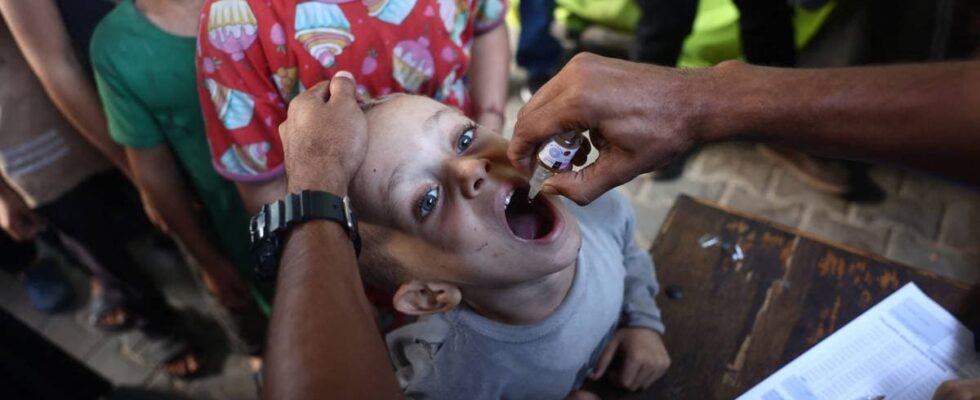The first round of the vaccination campaign took place last month after polio was detected in Gaza for the first time in 25 years. The campaign was considered a success. Now the second round is underway. To stop the transmission of the polio virus, at least two doses of the vaccine are needed, and at least ninety percent of children must be vaccinated to prevent spread. About 590,000 children in Gaza are vaccinated. Photo: EYAD BABA / AFP During the first round, approximately 590,000 children under the age of 10 were vaccinated against polio within 12 days, according to the World Health Organization. Another goal of this round is to reach children who did not receive the first dose of the polio vaccine last month. The campaign is carried out by the Palestinian Ministry of Health in collaboration with the World Health Organization (WHO), the United Nations Children’s Fund (UNICEF), the United Nations Relief and Works Agency for Palestine Refugees (UNRWA) and other partners. Risk of major outbreak – Almost the entire population is concentrated in only 10-15 percent of the Gaza area, with poor sanitary conditions. This could lead to a major virus outbreak, says Håkon Jakob Røthing to news. He is program manager for the Red Cross. Even if the health workers do not have access to all the areas, it will probably ensure that we avoid a polio epidemic in Gaza, if the second round is carried out, says Røthing in the Red Cross. Photo: Red Cross The war in Gaza has halted all regular vaccination programmes, which has meant that the population of Gaza can be affected by diseases that were previously almost eradicated. In August, a ten-month-old girl was diagnosed with polio. She was born after the outbreak of war. This was the first polio case documented in 25 years in Gaza. Polio is most often spread by contact with the faeces of an infected person, but can also be spread through contaminated water or food. Although it causes mild or no symptoms in most people, it can lead to paralysis, breathing problems and death. This is polio Polio, also known as poliomyelitis, is an acute infectious infection with poliovirus. The virus can attack and destroy motor cells in the spinal cord and thus cause paralysis. The disease particularly affects children under the age of five. In the first half of the 20th century, polio was a feared disease in large parts of the world, but thanks to effective vaccines, the disease is now in the process of being eradicated. In Norway, several epidemics occurred until the beginning of the 1950s. Viruses can be excreted in the faeces for up to 18 weeks, and during this period can infect new people. Source: Store Medisinske Leksikon The war in Gaza has halted all regular vaccination programmes, which meant that the population in Gaza could be affected by diseases that were previously almost extinct. Photo: Ramadan Abed / Reuters Humanitarian pause is a prerequisite, says WHO Once again, a humanitarian pause will be necessary to carry out a successful second round, especially to ensure that all health workers can operate in a safe and secure environment, WHO writes in a press release. During the first round, a nine-hour daily humanitarian break was agreed in specific areas to ensure the safety of health workers and enable vaccination work. – In areas where humanitarian pauses took place, the campaign provided not only vaccines, but also moments of calm, said Dr. Peeperkorn, WHO representative for the occupied Palestinian territory. This work has clearly shown the world what is possible when peace is given a chance, says Dr. Peeperkorn in WHO. Photo: FABRICE COFFRINI / AFP As we prepare for the next round in four weeks, we hope these pauses will continue, because this work has clearly shown the world what is possible when peace is given a chance, he added. UNICEF Executive Director Catherine Russell wrote in a social media post last week that area-specific humanitarian pauses have been agreed. – Without humanitarian breaks, it is impossible to vaccinate the children, she wrote. Not only important for the Palestinian children, but also for the world The world has been fighting against polio for a long time and has almost succeeded in eradicating the disease. Now polio is found only on the border between Pakistan and Afghanistan. Afghan health workers vaccinate the children. Photo: SANAULLAH SEIAM / AFP – This is not only a problem for Palestinian children, but for the whole world. It is also a problem for Israel, which is Gaza’s neighbour, says Røthing. He praises the health workers who work in extreme conditions. – We must recognize that we have managed to vaccinate almost 600,000 children through an enormous mobilization of health workers. The health workers in Gaza have to carry out the vaccination work under demanding conditions. Photo: Ramadan Abed / Reuters WHO originally aimed to vaccinate around 640,000 children in Gaza. After last month’s round, the organization said this number may have been too high. The ongoing displacement and deaths caused by the war between Israel and Hamas may have affected the number of children. More than 16,000 children have been killed in Gaza since the start of the war, according to Gaza health authorities. Photo: Hatem Khaled / Reuters – We manage to solve major challenges even under extremely difficult working conditions, which is the case in Gaza, says Røthing. This gives hope that we will be able to complete the second round, he adds. Published 15.10.2024, at 16.49
ttn-69
Second round of polio vaccinations has begun in Gaza – news Urix – Foreign news and documentaries

